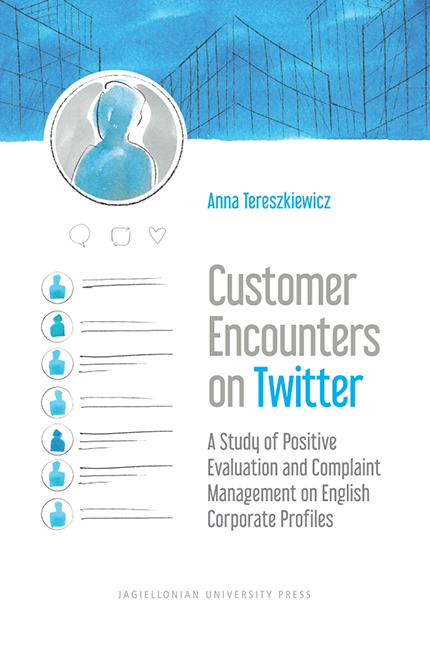 Customer Encounters on Twitter
Customer Encounters on Twitter Book contents
- Frontmatter
- Table of Contents
- Acknowledgements
- Introduction
- Chapter 1 Social media and corporate communication
- Chapter 2 Customer encounters as a genre of social interaction
- Chapter 3 Corporate profiles on Twitter – general characteristics
- Chapter 4 Positive evaluation and complaint management on Twitter
- Chapter 5 Selected politeness and lexicogrammatical properties of the tweets
- Conclusions
- References
Chapter 4 - Positive evaluation and complaint management on Twitter
Published online by Cambridge University Press: 09 February 2022
- Frontmatter
- Table of Contents
- Acknowledgements
- Introduction
- Chapter 1 Social media and corporate communication
- Chapter 2 Customer encounters as a genre of social interaction
- Chapter 3 Corporate profiles on Twitter – general characteristics
- Chapter 4 Positive evaluation and complaint management on Twitter
- Chapter 5 Selected politeness and lexicogrammatical properties of the tweets
- Conclusions
- References
Summary
Methods and materials
Methods
The analysis focuses on company responses and management strategies. An overview of consumers’ messages is provided for additional background and the illustration of the practices of interaction in the medium. A detailed analysis of the acts of positive evaluation, complaining and complaint strategies posted by consumers on Twitter, however, was not the main object of the study.
The study comprises the analysis of structural and pragmatic components in companies’ tweets. Due to a diversified nature of the interaction and the research topics, the analysis drew from a number of methodological approaches.
In investigating the organization of the encounters, the study relies on speech act theory (Searle 1969) and conversation analysis (Schegloff 2007).
More specifically, as regards the analysis of the strategies used in the management of the reviews, the investigation of positive evaluation was conducted with reference to the frameworks developed in the context of complimentary behaviour. The strategies were classified based on previous typologies of compliments and compliment responses developed by Manes and Wolfson (1981), Holmes (1986) and Herbert (1989).
The discussion of consumers’ tweets also draws from the research devoted to the phenomenon of evaluation in language. Evaluation devices were identified inductively by a close reading of the tweets. The identification of the mechanisms was performed based on findings of the previous research devoted to evaluation in different contexts (e.g. Hunston and Thompson (eds.) 2003, Martin and White 2005, Bednarek 2006, 2008, Myers 2010, Zappavigna 2012, Vásquez 2014). The means of expression were identified with reference to three broad areas of appraisal, i.e. emotional affect, aesthetic appreciation and moral judgement (Martin and White 2005). The overviews of consumers’ tweets show the most frequent lexicogrammatical and discourse-level means of expression the customers use to evaluate products and behaviour, and to indicate emotional reactions.
As far as complaint management is concerned, consumer complaints were identified based on previous research on complaint strategies, i.e. classifications developed by House and Kasper (1981), Olshtain and Weinbach (1987, 1993), Trosborg (1995), Meinl (2010), Decock and Spiessens (2017), Decock and Depraetere (2018), as well as evaluation studies mentioned above.
The investigation of complaint management strategies employed by companies was conducted with reference to research devoted to the speech act of apology. Complaints and apologies, namely, are said to constitute an adjacency pair, where an apology represents the “preferred” act which follows the speech act of complaining (Trosborg and Shaw 1998: 72). The analysis of the responses was based on the frameworks developed by Blum-Kulka et al.
- Type
- Chapter
- Information
- Customer Encounters on TwitterA Study of Positive Evaluation and Complaint Management on English Corporate Profiles, pp. 89 - 180Publisher: Jagiellonian University PressPrint publication year: 2022


